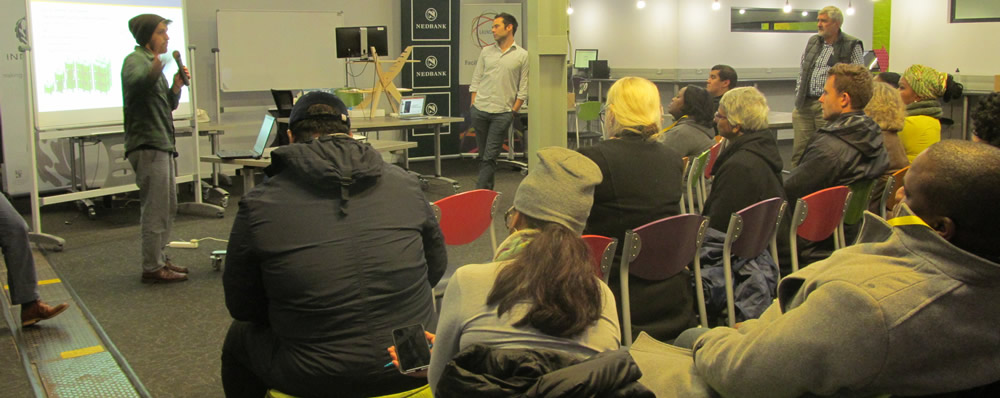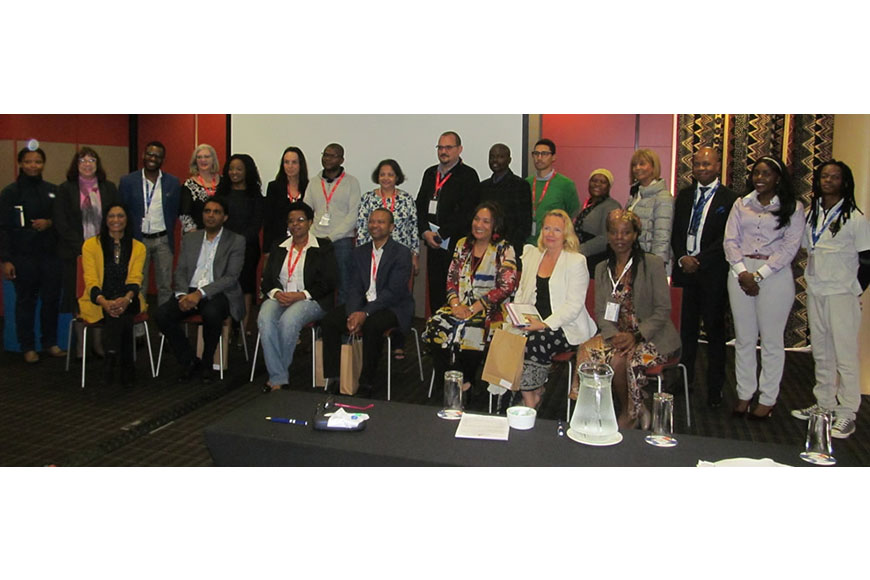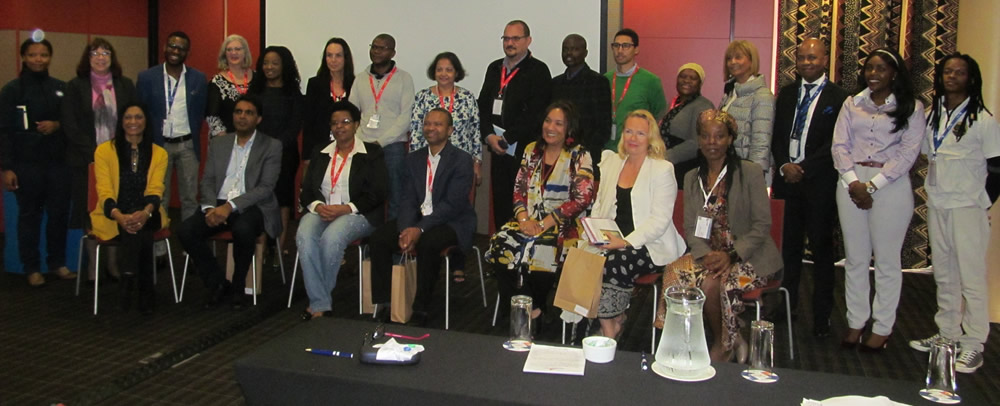At the Entrepreneurship Development in Higher Education (EDHE) Lekgotla 2019 that ended in Durban recently, ideas abounded around what could turn public universities into truly entrepreneurial entities. These ideas flowed from almost all sessions of the 4-day Lekgotla, and some of them are shared below.
In her talk on Institutional and Organisational Drivers for Entrepreneurship and Innovation, Professor Sibusiso Moyo, Deputy Vice-Chancellor: Research and Innovation at the Durban University of Technology (DUT), shared what she called a “BRAP framework” which represents Basic Human Capacity, Resources, Agile and Quality Curriculum and Planning.
Ahead of breaking down this framework for the EDHE Lekgotla audience, Prof Moyo mentioned that she had derived the model from years of experience of managing DUT’s research and innovation portfolio and from various national and international networks including those made through the previous Lekgotla. She said building this framework into strategic plans within her own portfolio and those reporting to her had proven to be one of numerous recipes for success.

Professor Sibusiso Moyo, DVC: Research and Innovation at DUT, believes that “well resourced, impact-driven and measurable strategies render universities entrepreneurial. But those strategic plans must culminate in visible student innovations and enterprises whose success can be credited to institutional intervention.” DUT’s Entrepreneurial Centre and Desk has yielded numerous such success stories.
Photo: Supplied, courtesy of DUT
In this framework, Basic human capacity referred to having a reasonable pool of people with interest in innovation and entrepreneurship from a whole range of areas including students, the teaching and support personnel, mentors from various university enterprises as well as external partners. Resources referred to infrastructure, funding, creative spaces and equipment. An Agile & Quality Curriculum was one that nurtured skills for competitiveness and innovation and allowed time for creative thinking, learning and self-discovery, whereas Planning was about institutional strategies with clear, impactful and measurable outcomes that are backed up by relevant resources.
It is OK for students to have better ideas
As regards basic human capacity, Prof Moyo said in this digitized world, universities were seeing unprecedented levels of information flow. It was therefore not unusual to find students with better ideas than their lecturers or supervisors. “Let us not be consumed by the know-it-all syndrome. It is okay for students to have better ideas, solutions and innovations. We need to encourage those ideas, which fuel innovation.”
She said resources were not just about availability of the necessary infrastructure, but also about institutions’ openness to interdisciplinary and collaborative teams and also to allowing students to feel, touch and use the equipment at their disposal. “Can they experiment on their own to see how things work?”
On agile and quality curriculum, Prof Moyo was concerned about the extent to which institutions generate competitive and innovative skills in students; whether they measure their graduate attributes.The extent to which institutions allow space in their environments for curriculum re-design and for students and staff to retreat and re-generate ideas was also important, she added. In doing so, institutions must take into consideration, current trends on both national and global platforms; lecturer overload (or overteaching) and what she termed student “lectureload” follows (not allowing students time to think creatively, to innovate and to initiate enterprises).
Reward students and staff who push beyond institutional boundaries
Finally, strategic planning was about whether the organisational plan was implementable and measurable. “Is it well-resourced? How are outcomes evaluated? What are the annual performance indicators and how are these monitored and measured? Are there visible businesses, student innovations and enterprises that can be listed as having emanated from university interventions? Do we have approved annual plans and activities that are open to all students, irrespective of field of study? Are these plans addressing interdisciplinary challenges that respond to community or industry needs? Are there any reward systems for students who excel and for staff who push beyond the institutional boundaries?”
Prof Moyo concluded that higher education institutions play a critical role in mentoring and creating enabling environments for the next generation of entrepreneurs and innovators – “hence need to constantly evaluate their strategies to meet current demands both at regional and national level, to contribute to the socio-economic transformation agenda and to produce global citizens who are agile and responsive to global challenges.”

“If entrepreneurship is about problem-solving, there is no place for it in bureaucratic institutions. We need to enable quick decision making to make things happen,” said Prof Deresh Ramjugernath, Deputy Vice-Chancellor: Research at UKZN.
Photo: Supplied, courtesy of UKZN
Kill bureaucracy; inject agility for swift decision-making
Professor Raphael Mpofu, Acting Executive Dean: Graduate School of Business Leadership at the University of South Africa said at giant institutions like his, “it takes a lot for things to happen, given the size of, and bureaucracy in the institution.”
Prof Deresh Ramjugernath, Deputy Vice-Chancellor: Research at the University of KwaZulu-Natal (UKZN), who chaired the Lekgotla session titled Case Studies of University Entrepreneurship, fully concurred. “An entrepreneurial mindset in our nation has got to start at our institutions.” He said if entrepreneurship was about problem-solving, there was no place for it in bureaucratic institutions. “We need to inject some agility to enable reasonably quick decision making to make things happen. How do we streamline and improve our higher education operations for higher efficiencies?”
Allow flexibility in policies
Policies also needed to be adapted to create entrepreneurial institutions, the EDHE Lekgotla heard. For example, it does not make sense that teaching staff are prohibited from running businesses when entrepreneurship is all about “doing” and teaching from the school of experience, Professor Sibusiso Moyo stated in another discussion session that was dedicated to Developing Entrepreneurial Universities. She also intimated that institutional policies must provide for communities to share in the profit benefits of enterprises born out of community based research and knowledge systems.
Attendees in Track 3: Developing Entrepreneurial Universities on Day 3 of the EDHE Lekgotla. In the front row sit members of the panel that led discussions in this track. From left, Dr Poppet Pillay, Session Chair and Convenor of the EDHE Community of Practice for Entrepreneurial Universities: DUT; Prof Deresh Ramjugernath, DVC: Research, UKZN; Ms Ntombi Mthembu, Human Resources and Entrepreneurship Lecturer, Mangosuthu University of Technology (MUT); Mr Edward Selebi, lecturer in Business Management at MUT; Ms Charleen Duncan, Convenor of the EDHE Community of Practice for Entrepreneurial Universities, University of the Western Cape; Ms Jaana Puukka, Founder: Innovation Engage who had presented a paper in the plenary titled “Unleashing the entrepreneurial potential of universities: Lessons from near and far and Prof Sibusiso Moyo, DVC: Research andInnovation: DUT.
Dr Gatsheni also brought under the spotlight, intellectual property ownership and benefit rights which were often subject to competing claims. Another delegate noted that misunderstandings and frustrations that came with intellectual property agreements often led to students discarding their creations altogether.
In yet another session on Knowledge Exchange for Change, the Chair asked how governance structures at institutions could aid entrepreneurship. In response, Mr Lebo Jiya, a graduate of the University of KwaZulu-Natal who is now a full-time entrepreneur, called for more freedom in students, stating that “without the freedom that governance structures often take away, students’ creativity is repressed,” said. Although he did not elaborate on this, numerous other contributors echoed this opinion, arguing that governance structures within universities often perpetuated the frustration inherent in entrepreneurship. Though they acknowledged the importance of the role of goof governance in creating order within institutions, many felt that these governance structures also impede innovation in students. This might warrant further examination at institutional level.

While some delegates proposed the abolishment of student entrepreneurship policies altogether, pointing out, among other matters, that some policies prevent the use and sharing of multi-disciplinary resources within a university institution, this suggestion did not gain traction in the group. Delegates did, however, support the idea of universities supporting student-run businesses.
Recognise that entrepreneurship is transdisciplinary by nature
The Lekgotla delegates also challenged the perception that entrepreneurship belongs exclusively in commerce departments or science faculties. They argued that in the modern world, solutions are found through collaboration and cooperation across disciplines and that many student innovations and enterprises are bound to be born from these exchanges.
Ms Matshepo Rathebe, Project Coordinator at the Vaal University of Technology’s Enterprise Development Unit said, “Sharing innovative ideas among students is inevitable. It is, however, the responsibility of universities to encourage and support multidisciplinary efforts for the benefit of students and, ultimately, of institutions.”
Business incubation services are critical
During a session on Case Studies of University Entrepreneurship, Professor Raphael Mpofu had also mentioned the importance of providing business incubation services within universities. He said incubators provide a platform from which theory can be integrated with business practice for solid learning and increased entrepreneurial success.
 A student explaining to the EDHE Lekgotla delegation in 2018, how Stellenbosch University’s Launchlab had helped turn his business idea into a tangible enterprise.
A student explaining to the EDHE Lekgotla delegation in 2018, how Stellenbosch University’s Launchlab had helped turn his business idea into a tangible enterprise.
In fact, a session dedicated to Incubation at Universities and TVET Colleges bore testimony to the value of incubation services within institutions. Among other initiatives, delegates heard how the Small Enterprises Development Agency (SEDA) is playing a role within the postschool education and training sector in this regard, whereas Stellenbosch University’s Launchlab shared key considerations in setting up and running a student business incubator.
In addition, the University of the Western Cape’s students, under the direction of the university’s Centre for Entrepreneurship and Innovation, performed a WearSA theatre production impressing upon the audience, the importance of supporting students’ and SA-made fashion and merchandise.
From the Mangosuthu University of Technology, delegates in the Developing Entrepreneurial Universities track heard how Human Resources and Entrepreneurship lecturers are contributing to unlocking entrepreneurial creativity in students.
Ultimately, the EDHE Lekgotla 2019 agenda was packaged in such a way that it served all three goals of the EDHE Programme, namely:
- Student entrepreneurship by mobilising the national student and graduate resource to create successful enterprises that will ultimately lead to both wealth and job creation;
- Entrepreneurship development in academia by supporting academics in instilling an entrepreneurial mindset within all students and graduates through the offering of relevant knowledge, transferral of practical skills and the application of business principles across disciplines;
- Developing entrepreneurial universities by creating a conducive environment that will enable universities to adapt strategically and embark on projects whereby third-stream income can be generated through innovative business ideas.
The EDHE Programme, a facility founded under the Department of Higher Education and Training’s University Education Branch in 2016, has since May 2018 been re-located to Universities SA (USAf) for implementation and day-to-day administration. To that end, the programme is being funded for three years ending in 2020, from the DHET’s Universities Capacity Development Programme for R18 million.
Ntokozo Thembela, the co-writer, is a 3rd year Journalism student in the Department of Media, Language and Communication in DUT’s Faculty of Arts and Design.
Source: https://www.newssite.co.za/usaf/entrepreneurial_universities.html



